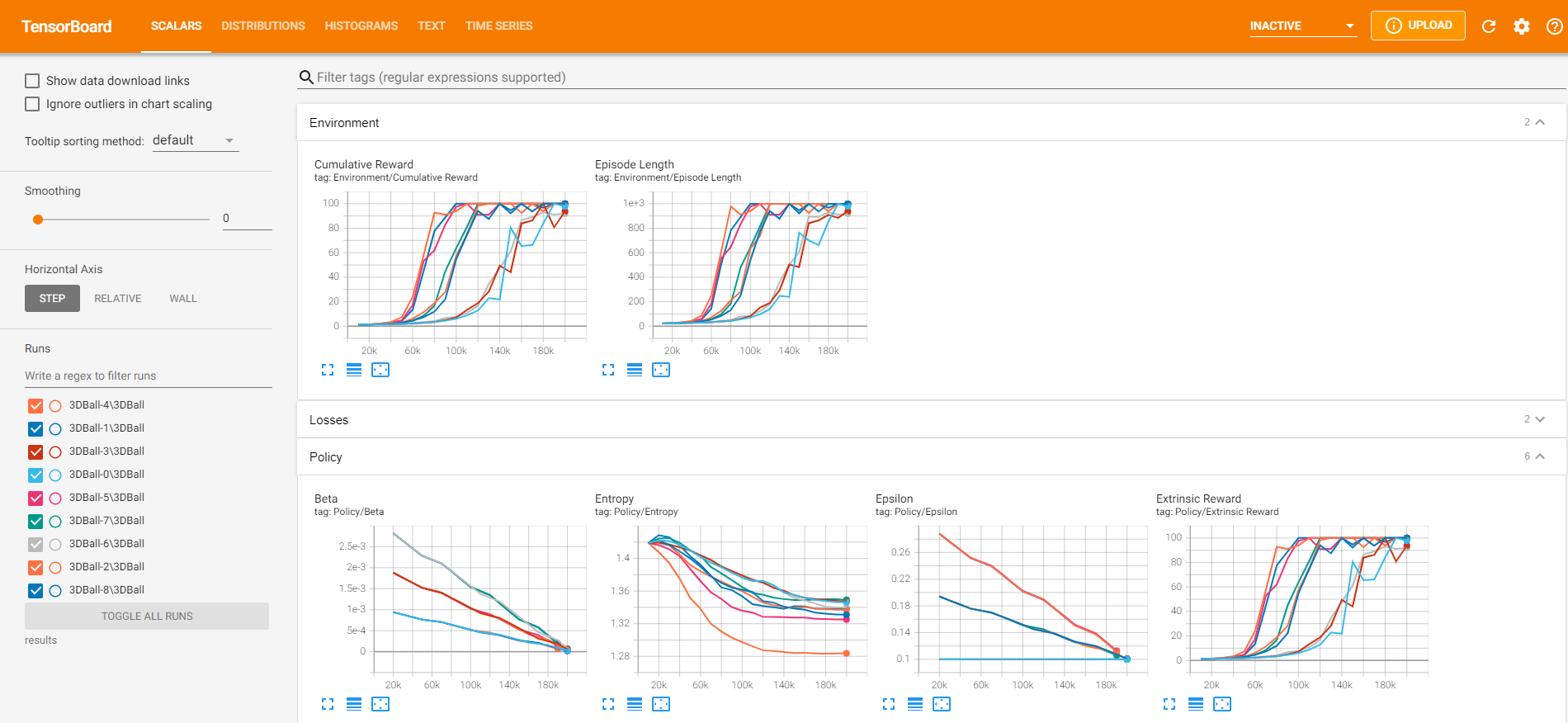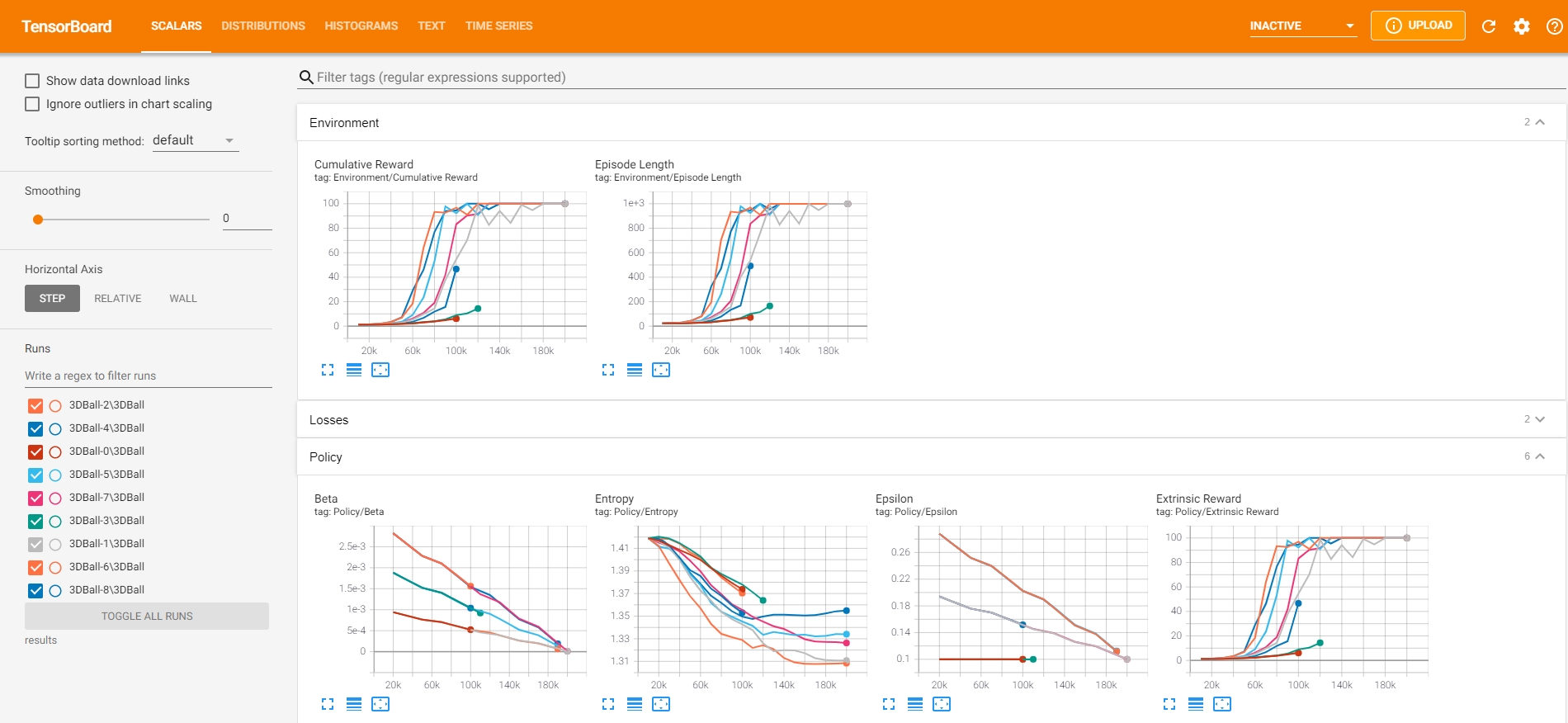This is an experimental batch runner for Unity ML-Agents training processes. It is supposed to automate hyperparameter grid searches and currently only works in Windows OS.
Modify your trainer config file by adding opt_values and opt_stop yaml parameters.
opt_values lists parameter value options, for example
behaviors:
3DBall:
trainer_type: ppo
hyperparameters:
batch_size: 64
buffer_size: 12000
learning_rate: 0.0003
beta:
opt_values: [0.001, 0.002, 0.003]
epsilon:
opt_values: [0.1, 0.2, 0.3]
lambd: 0.99
num_epoch: 3
learning_rate_schedule: linear
network_settings:
normalize: true
hidden_units: 128
num_layers: 2
vis_encode_type: simple
reward_signals:
extrinsic:
gamma: 0.99
strength: 1.0
keep_checkpoints: 5
max_steps: 500000
time_horizon: 1000
summary_freq: 12000
Here, only numerical values are defined, but opt_values works with all value types.
mlagents-learn.py will generate training runs for all possible combinations of the specified values. In this case 3 x 3 = 9 runs.
The python script saves a config_info.txt file, listing individual value combinations associated with run IDs. The run IDs are suffixed with sequential numbers, here's the config_info.txt for above example:
3DBall-0 - 3DBall - beta: 0.001 - epsilon: 0.1 3DBall-1 - 3DBall - beta: 0.001 - epsilon: 0.2 3DBall-2 - 3DBall - beta: 0.001 - epsilon: 0.3 3DBall-3 - 3DBall - beta: 0.002 - epsilon: 0.1 3DBall-4 - 3DBall - beta: 0.002 - epsilon: 0.2 3DBall-5 - 3DBall - beta: 0.002 - epsilon: 0.3 3DBall-6 - 3DBall - beta: 0.003 - epsilon: 0.1 3DBall-7 - 3DBall - beta: 0.003 - epsilon: 0.2 3DBall-8 - 3DBall - beta: 0.003 - epsilon: 0.3
Note that setting opt_values for multiple behaviors will increase the number of runs exponentially, because every behavior permutation will be combined with every other behavior permutation.
default_settings:
hyperparameters:
beta:
opt_values: [0.001, 0.002, 0.003]
epsilon:
opt_values: [0.1, 0.2, 0.3]
behaviors:
Goalie:
trainer_type: poca
hyperparameters:
...
Striker:
trainer_type: poca
hyperparameters:
...
In the above example, opt_values is set in default_settings which means the value permutations will be applied to both behaviors individually. The resulting run count would therefore be (3 x 3) x (3 x 3) = 81.
You can define optional stop conditions with the opt_stop parameter:
behaviors:
3DBall:
trainer_type: ppo
hyperparameters:
...
opt_stop:
tag: Environment/Cumulative Reward
step: 100000
min: 50
Stop conditions require TensorBoard to be running at http://localhost:6006/ The python script queries TensorBoard's HTTP API once a minute and checks if the active runs' latest scalar values satisfy the stop conditions.
tagTensorBoard tag, for instanceEnvironment/Cumulative RewardstepWhen to start checking values, defaults to 0minThe condition will evaluate true if the latest value is below min, defaults to -999999999maxThe condition will evaluate true if the latest value is above max, defaults to +999999999
In the above example, we start checking if cumulative rewards are above 50 after 100k steps. Runs that don't make the cut are being stopped prematurely.
Launch your training runs by calling python mlagents-learn.py with all the command line arguments you would normally pass to mlagents-learn. Assuming that you train with executable environments, you should specify the --num-envs argument for the number of concurrent training runs (defaults to 1). The script will open corresponding python consoles for mlagents-learn subprocesses, watch their progress and log start/stop events for the individual runs.
BTW, please ignore the "Contributors" section on this page. I think I originally forked the ML-Agents repo and must have messed up my git settings at some point, somehow causing that info to end up here.

